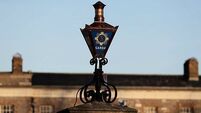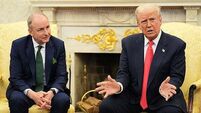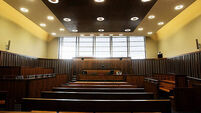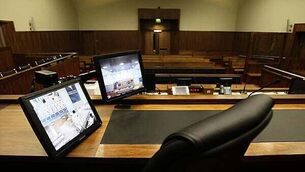Retired soldier loses appeal after claiming his concussion led to sexual assault on colleagues
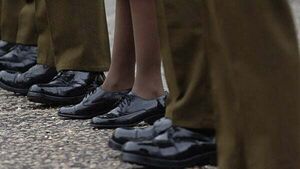
Fiona Magennis
A retired member of the Defence Forces who claimed he was suffering from concussion when he sexually assaulted two colleagues after consuming vodka from a bottle that had been destined for the “company padre” has had his conviction upheld by the Court of Appeal.
Following a Court Martial hearing in April 2024, Richard Muldarry was convicted of a number of offences, including sexually assaulting a female colleague by placing his right hand on the inside of her leg without consent and moving his hand towards his groin at a military base in the early hours of November 13th, 2021.
He was also found guilty of sexually assaulting a male colleague by putting his arms around him in a hugging gesture and moving his face towards him, causing the man to apprehend that he was attempting to kiss him.
Further offences included committing conduct to the prejudice of good order and discipline contrary to Section 168(1) of The Defence Act 1954 by lying down on his back, raising his legs towards his head and presenting his buttocks area, saying “come on, just this one time in band camp”, and committing conduct to the prejudice of good order and discipline by simulating oral sex.
Muldarry was given a six-month sentence, suspended for one year, in respect of the sexual assault offences against his two colleagues.
A period of detention of five days was imposed for a charge of behaving in a disorderly manner due to being under the influence of an intoxicant, and various fines and reprimands were imposed in respect of the various other charges.
Muldarry was a serving member of the Defence Forces at the time but retired prior to the Court Martial proceedings taking place.
He launched an appeal against his conviction on Friday, arguing that the military trial judge made an error in admitting the evidence of a Consultant Forensic Psychiatrist who gave evidence on behalf of the prosecution and in refusing to admit photographs of Muldarry.
After hearing submissions from both sides this afternoon, Mr Justice Peter Charleton said the court was not upholding either ground advanced and dismissed the appeal.
In bringing the appeal before the three-judge court, Kathleen Leader SC, representing Muldarry, said the facts weren’t contested in any way at the Court Martial proceedings.
She said her client had stated that he had no memory of his behaviour on the night in question, and thereafter the matter was defended on the basis that a verdict of not guilty by reason of insanity should be arrived at by the jury.
Expert psychiatric evidence was presented on behalf of Muldarry by Professor Patricia Casey, counsel said, who concluded that his behaviour was the result of a blow to the head sustained before the events unfolded, which likely caused a concussion.
She said the possibility was raised that Muldarry had experienced an episode of dissociation at the time.
Ms Leader said Dr Paul O’Connell was called for the prosecution, but his evidence “didn’t speak to the issue of concussion” because that wasn’t what he was asked to do. She said thereafter he didn’t perform any assessment of Muldarry relative to the fact that he had received a blow to the head.
“In circumstances where it wasn’t even considered by Dr O’Connell, he shouldn’t even have given evidence on the basis of relevancy,” said counsel.
Ms Leader said given Muldarry’s defence that what happened was a result of concussion from a blow to the head, photographs he said he had taken of his injuries should have been admitted.
However, the Director of Military Prosecutions senior counsel Diarmuid Collins said in the modern age, photographs can be easily altered. He said the veracity of the pictures in question had not been tested and there was no evidence given that they hadn’t been altered.
Mr Collins said Dr O’Connell had given an addendum report disagreeing with the evidence given by Dr Casey. He said Dr O’Connell’s evidence was that the behaviour was caused by intoxication.
In dismissing Muldarry’s appeal against his conviction, Mr Justice Peter Charleton said the events related to date at a military base when a bottle of vodka which had been destined for the “company padre” had ended up in a room with Mr Muldarry and two other people.
He said the alcohol was consumed, a fight broke out and the net result was that Muldarry seemed to have received “a couple of punches to the face”.
He said a theory had been posited that what subsequently transpired could have happened as a consequence of Muldarry experiencing a dissociative state and the consumption of whatever portion of the bottle of vodka he had consumed.
Mr Justice Charleton said Dr O’Connell’s evidence was relevant because it dealt with the circumstances of the case.
He said Dr O’Connell had provided a detailed report outlining Muldarry’s medical history, his mental state at the time of examination and reviews of all his medical records. He said Dr O’Connell came to the conclusion that the former Defence Forces member behaved in a manner that was consistent with having consumed alcohol.
The psychiatrist found it was likely Muldarry’s tolerance to alcohol was very low and he may have consumed more alcohol than he was used to on the date in question, the judge noted. The doctor said it was possible to have an alcohol blackout, but that this was not a dissociative state, Mr Justice Charleton added.
He went on to say that the provenance of photographs is very important, particularly in the age of AI and digital manipulation.
He noted that while the court was not suggesting the photographs in question had been altered, their provenance had not been established, and the Court of Appeal found no error on the part of the military judge in ruling against their admission.
